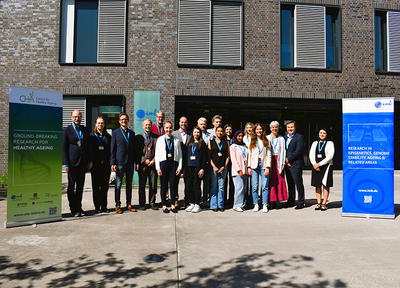IMB and the Centre for Healthy Ageing (CHA) receive €1.3 million to study the causes of age-related diseases
The Ministry of Science and Health (MWG) of the State of Rhineland Palatinate (RLP) has awarded €1.3m to the Institute of Molecular Biology (IMB) and the Centre for Healthy Ageing (CHA) in Mainz, Germany, to establish a new doctoral training programme. This programme—CoAGE (“Cohorts for Healthy Ageing”)—will investigate what causes age-related diseases and how we can age more healthily.
With age, our risk of getting cancer, cardiovascular disease, obesity, diabetes and neurodegenerative disease dramatically rises. These age-related diseases are often incurable and chronic, and are the main reason for poor health as we get older. Moreover, the majority of elderly people suffer from more than one disease at the same time – a condition called multimorbidity – which makes it difficult for doctors to treat them.
To find ways to encourage healthy ageing, the Ministry of Science and Health in RLP has decided to fund a new doctoral programme called CoAGE, which aims to decipher the causes of age-related diseases and multimorbidity. CoAGE is jointly coordinated by IMB and the CHA and will bring together top researchers across Germany who lead cohort studies to work on ageing-related research projects.
Cohort studies are observational studies with thousands of human participants that take place over many years, sometimes decades. In Mainz, for example, the Gutenberg Health Study has over 15,000 participants who are monitored every 5 years since it started in 2007. Such large population studies allow researchers to discover factors (e.g. genetics, diet, lifestyle) that contribute to health or disease.
CoAGE includes seven cohort studies at six institutes, namely:
The Gutenberg Healthy Study (GHS) at the University Medical Center Mainz
The National Cohort Health Study (NAKO) at Helmholtz Munich
The Cooperative Health Research in the Region of Augsburg (KORA) study at Helmholtz Munich
The Rhineland Study at the German Center for Neurodegenerative Diseases (DZNE) in Bonn
The Hamburg City Health Study (HCHS) at the University Medical Centre Hamburg-Eppendorf
The LIFE Adult Cohort at Leipzig University
The Study of Health in Pomerania at Greifswald University Hospital
The programme will train young doctoral students to become future leaders in cohort studies and ageing research.
Science Minister Clemens Hoch says, “Ageing healthily and being able to live free of disease and functional limitations as long as possible is a goal that we all strive for. If we succeed in understanding the basic mechanisms of ageing and how they can lead to the development of disease, then it will be possible to develop therapies to improve health in old age. By funding CoAGE, we hope to gain important insights and a better understanding of the mechanisms of ageing in order to develop new approaches for even better diagnosis and treatment of age-related diseases in the future.”
Prof. Philipp Wild of the University Medical Centre Mainz and leader of the Gutenberg Health Study says, “This collaborative programme will allows us to investigate important aspects of ageing with data from more than one cohort and thus much larger datasets. This will give us important insights into the mechanisms of ageing and allow us to analyse key phenomena in a more differentiated way. CoAGE will also promote networking of early-career scientists in ageing research and strengthen our interactions with research institutes in this field throughout Germany. We are very grateful to the State of Rhineland-Palatinate for their continued support of ageing research in Mainz.”
Prof. Christof Niehrs, IMB’s Scientific Director, adds, “CoAGE will foster better networking between German study cohorts and help us discover new markers for identifying people at higher or lower risk of developing age-related diseases. In the long term, this research promises to improve healthy longevity for everyone.”
Further details
Further information can be found here.
About the Institute of Molecular Biology gGmbH
The Institute of Molecular Biology gGmbH (IMB) is a centre of excellence in the life sciences that was established in 2011 on the campus of Johannes Gutenberg University Mainz (JGU). Research at IMB focuses on the cutting-edge fields of epigenetics, genome stability, ageing and RNA biology. The institute is a prime example of successful collaboration between a private foundation and government: The Boehringer Ingelheim Foundation has committed 154 million euros to be disbursed from 2009 until 2027 to cover the operating costs of research at IMB. The State of Rhineland-Palatinate has provided approximately 50 million euros for the construction of a state-of-the-art building and is giving a further 52 million in core funding from 2020 until 2027. For more information about IMB, please visit: www.imb.de.
About the Centre for Healthy Ageing
The Centre for Healthy Ageing (CHA) is a virtual research centre launched in 2021 that brings together scientists in basic and clinical research from across Mainz that focus on ageing and age-related diseases. These findings can be used to promote healthy ageing and to find treatments that could prevent or cure age-related disease. For more information, please visit: www.cha-mainz.de.
Boehringer Ingelheim Foundation
The Boehringer Ingelheim Foundation is an independent, non-profit organization that is committed to promoting the medical, biological, chemical, and pharmaceutical sciences. It was established in 1977 by Hubertus Liebrecht (1931–1991), a member of the shareholder family of the Boehringer Ingelheim company. Through its funding programmes Exploration Grants, Plus 3, and Rise up!, the Foundation supports excellent scientists during critical stages of their careers. It also endows the prestigious Heinrich Wieland Prize and awards for emerging scientists. Additionally, it funds institutional projects combining AI and biomedicine, such as the AITHYRA institute in Vienna and a new research unit at the Center for Systems Biology in Dresden (BioAI Dresden). Other supported institutions include the Institute of Molecular Biology (IMB) in Mainz and the European Molecular Biology Laboratory (EMBL) in Heidelberg, both in Germany.
Press contact for further information
Dr Ralf Dahm, Director of Scientific Management
Institute of Molecular Biology gGmbH (IMB), Ackermannweg 4, 55128 Mainz, Germany
Phone: +49 (0) 6131 39 21455, Email: press(at)imb.de
